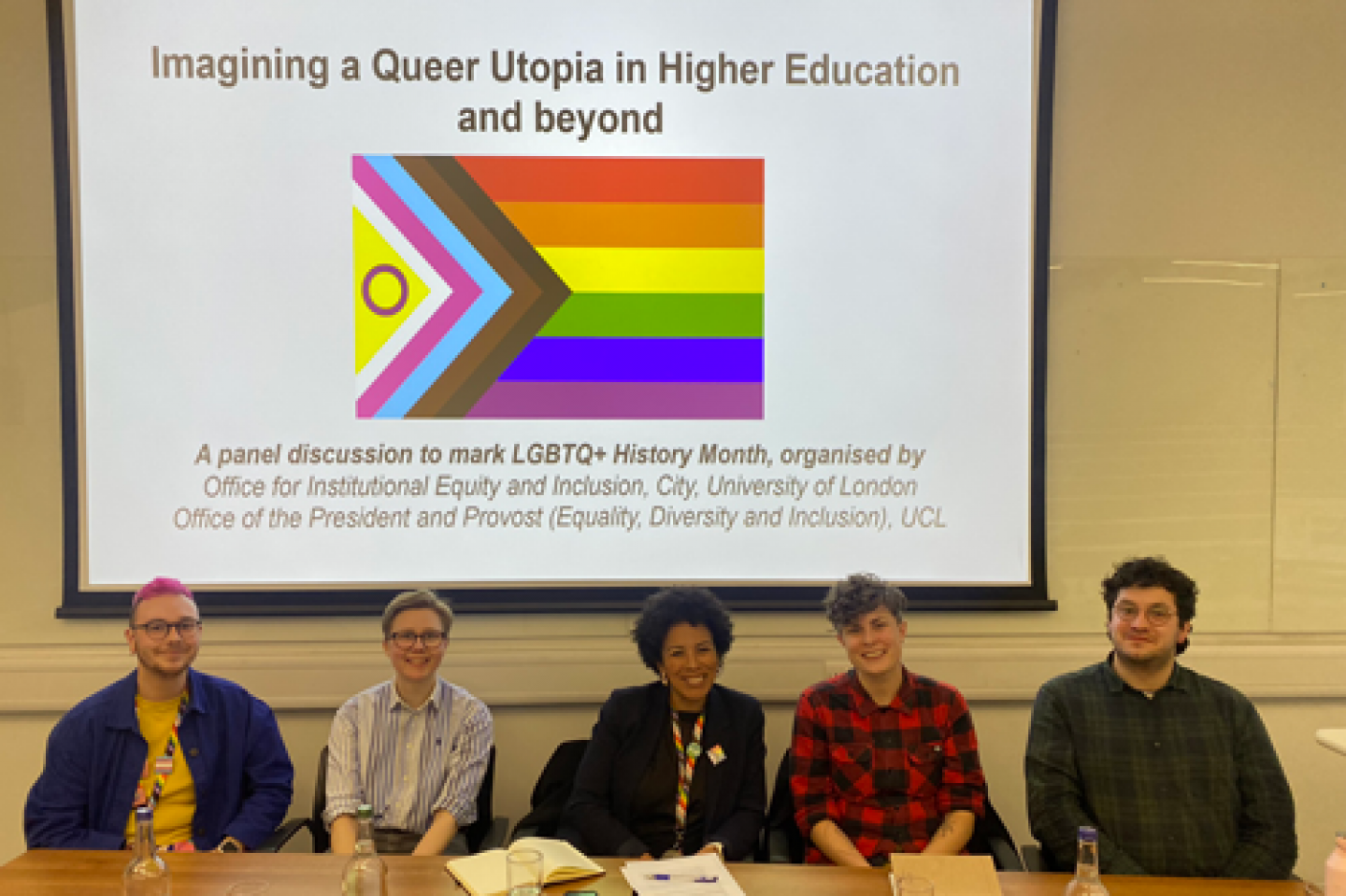City’s new Office for Institutional Equity and Inclusion hosted an LGBTQ+ History Month event to explore how LGBTQIA+ people can thrive in universities.
By Eve Lacroix (Senior Communications Officer), Published
“A queer utopia in higher education is a space that provides connection, care and solidarity,” said Dr Lo Marshall, a Senior Research Fellow at UCL, speaking at an event hosted at City, University of London.
The event, ‘Imagining a Queer Utopia in Higher Education and Beyond’, was a continued celebration of LGBTQ+ History Month, organised in collaboration with City’s Office for Institutional Equity and Inclusion (OIEI) and University College London (UCL).
The speakers were a mix of students, professional staff and academics from City and UCL whose personal experiences and research sit at multiple intersections of the LGBTQIA+ community.
The panellists included Dr Lo Marshall (Lecturer at UCL), Alim Kheraj (MA Creative Writing student at City), Graysen Whittaker (Senior EDI Officer for Gender and LGBTQIA+ at City) and Molly Edwards (BA Education Studies student at UCL).

The event was moderated by Dr Jessica Jones Nielsen, Assistant Vice-President for EDI at City, who recently led the University’s successful application for a Race Equality Charter bronze award. She welcomed a conversational approach for the event, inviting audience participation.
“Queer history should not only be celebrated in February but should be celebrated every month,” Jessica said. “I’m delighted to be here to reimagine a queer utopia in higher education with our speakers.”
Queer people have always existed in higher education
“As queer people, we may have been in the shadows, but we’ve always been here,” said Graysen Whittaker, the newly appointed Senior EDI Officer (Gender and LGBTQIA+) at City.
For panellist Molly Edwards, BA Education Studies student at UCL, shining a light on this once hidden history is of paramount importance. When looking through historical archives, they were struck by the available material on queer students, which had not been fully explored in research on higher education, despite the achievements of queer students in the 1970s gay liberation movement.
Their research aims to create a more inclusive history of UK universities by addressing the lack of representation of queer students in higher education narratives.
Panellist Alim Kheraj, an MA Creative Writing student at City, is also concerned with transcribing queer history. He is a journalist by trade and the author of Queer London, a book which illuminates key queer cultural establishments in London.
When deciding where to study, Alim was comforted by the diversity of the reading list on his programme at City. He noted the clearly visible LGBTQIA+ flag hanging from the University Building in Northampton Square, which he says sends a powerful message of inclusivity to the academic community.
How queering higher education benefits us all
University is a time of exploration and self-development – both intellectually and socially.
“University is a place where you can reinvent yourself many times over and a utopia would be a safe space in order to do that,” said Graysen.
UCL lecturer Lo believes the positive impact of an inclusive environment has ripple effects far beyond academia. “If you create conditions that encourage students to be more thoughtful about the experiences of their classmates, you also help students move through the world as more considerate people,” they said.
For UCL student Molly, the safety of an inclusive environment encourages everyone to produce their best work.
To make higher education more inclusive to queer people, City student Alim explored the need for more funded research and interaction with the local community. He noted City’s proximity to historically significant queer locations in Clerkenwell and King’s Cross.
Clerkenwell was once home to the now-defunct London Lesbian and Gay Centre, which was the first government-funded LGBTQ+ initiative. King’s Cross, a stone’s throw from campus, once housed the leftist pub the Bell. Today, King's Cross remains home to the radical bookshop Housmans and last year, the first UK LGBTQ+ museum Queer Britain opened in the area.
“At City, we are privileged to be located in a place with a rich queer history,” Alim said. “The University could provide grants for research and funding to house exhibitions exploring this history with members of the local community.”




